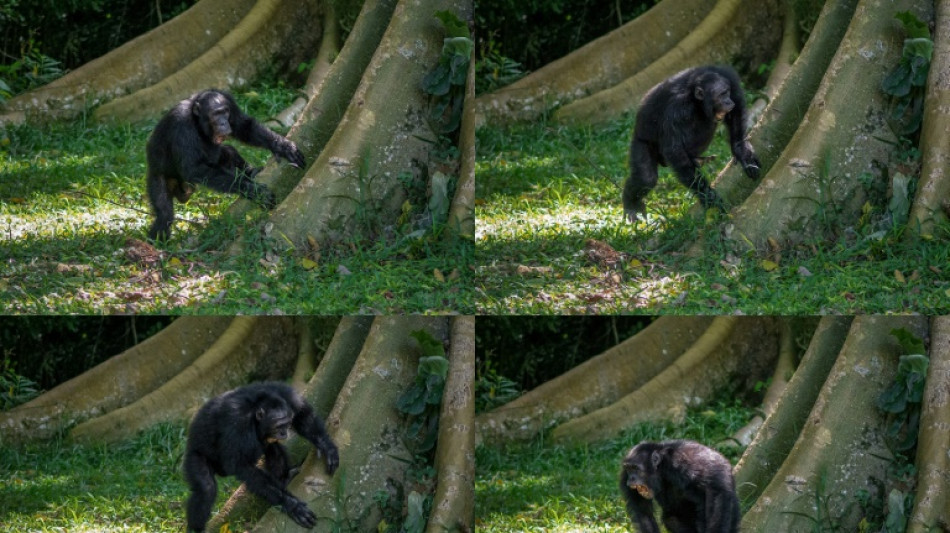
-
 Galthie recalls hulking locks Flament, Meafou for Italy
Galthie recalls hulking locks Flament, Meafou for Italy
-
Turkey, Saudi sign major solar power deal

-
 US Olympic freeskier Hess embraces 'loser' tag after Trump blast
US Olympic freeskier Hess embraces 'loser' tag after Trump blast
-
European stocks rebound, oil prices ease after US-Iran volatility

-
 'Alpha male' AI world shuts out women: computing prof Hall
'Alpha male' AI world shuts out women: computing prof Hall
-
New Zealand freestyle skier Ives in hard Olympic crash

-
 New Zealand must adapt quickly to Sri Lanka wickets: Chapman
New Zealand must adapt quickly to Sri Lanka wickets: Chapman
-
Thai activist's jail term for royal insult extended to 30 years

-
 Families of Duterte's drug war victims eye Hague hearing with hope
Families of Duterte's drug war victims eye Hague hearing with hope
-
India chases 'DeepSeek moment' with homegrown AI

-
 UN touts panel for 'human control' of AI at global summit
UN touts panel for 'human control' of AI at global summit
-
Ukraine Paralympics team to boycott Opening Ceremony over Russian flag decision: statement

-
 UK monarchy reels from Andrew's stunning arrest
UK monarchy reels from Andrew's stunning arrest
-
Somaliland, where Muslims love Israel

-
 Florida airport to be renamed after US President Donald Trump
Florida airport to be renamed after US President Donald Trump
-
Fans flock to Japan zoo to see viral baby monkey Punch

-
 Stocks mixed, oil rises after Trump Iran threat
Stocks mixed, oil rises after Trump Iran threat
-
Outspoken Laos lawmaker's election exit sparks rare dissent

-
 Kim Jong Un vows to boost living standards as he opens rare congress
Kim Jong Un vows to boost living standards as he opens rare congress
-
Shepherd hat-trick to Samra ton: Five top T20 World Cup performances so far

-
 Zimbabwe surprise as T20 World Cup Super Eights begin without Australia
Zimbabwe surprise as T20 World Cup Super Eights begin without Australia
-
Victorious Takaichi promises 'strong and prosperous' Japan

-
 Ex-South Korea leader apologises for martial law crisis
Ex-South Korea leader apologises for martial law crisis
-
Ex-S. Korea leader apologises for martial law crisis

-
 Messi kicks off MLS season in key World Cup year
Messi kicks off MLS season in key World Cup year
-
Teen burnout to Olympic gold: Alysa Liu 'looking to inspire others'

-
 Cunningham stars as NBA-leading Pistons ease past Knicks
Cunningham stars as NBA-leading Pistons ease past Knicks
-
Andre Gomes joins MLS side Columbus Crew

-
 Scottish inconsistency 'bugs everyone' says former international Beattie
Scottish inconsistency 'bugs everyone' says former international Beattie
-
England turn to Pollock for Six Nations boost against Ireland

-
 Arsenal aim to banish title jitters in Spurs showdown
Arsenal aim to banish title jitters in Spurs showdown
-
Scrutiny on Flick rises as Barca seek recovery

-
 Leipzig host red-hot Dortmund with Champions League hopes slipping away
Leipzig host red-hot Dortmund with Champions League hopes slipping away
-
Nvidia nears deal for scaled-down investment in OpenAI: report

-
 Japan inflation eases in welcome news for PM Takaichi
Japan inflation eases in welcome news for PM Takaichi
-
McIlroy shares Riviera clubhouse lead as Rai charges, Scheffler fades

-
 Philippines' Duterte earned global infamy, praise at home
Philippines' Duterte earned global infamy, praise at home
-
Stocks drop, oil rises after Trump Iran threat

-
 As European heads roll from Epstein links, US fallout muted
As European heads roll from Epstein links, US fallout muted
-
Families of Duterte's drug war victims eye Hague hearing hopefully

-
 Russian decision is a betrayal: Ukrainian Paralympics chief
Russian decision is a betrayal: Ukrainian Paralympics chief
-
Venezuela parliament unanimously approves amnesty law

-
 Martinez missing as Inter limp to Lecce after Bodo/Glimt humbling
Martinez missing as Inter limp to Lecce after Bodo/Glimt humbling
-
India chases 'DeepSeek moment' with homegrown AI models

-
 World leaders to declare shared stance on AI at India summit
World leaders to declare shared stance on AI at India summit
-
'Everything was removed': Gambians share pain with FGM ban in balance

-
 Kim Jong Un opens rare party congress in North Korea
Kim Jong Un opens rare party congress in North Korea
-
Ex-Philippine leader Duterte faces pre-trial ICC hearing

-
 Japanese star Sakamoto 'frustrated' at missing Olympic skating gold
Japanese star Sakamoto 'frustrated' at missing Olympic skating gold
-
Japan inflation eases in welcome news for Takaichi


Jungle music: Chimp drumming reveals building blocks of human rhythm
Out west, they groove with fast, evenly spaced beats. In the east, it's more free-form and fluid.
Like humans, chimpanzees drum with distinct rhythms -- and two subspecies living on opposite sides of Africa have their own signature styles, according to a study published Friday in Current Biology.
The idea that ape drumming might hold clues to the origins of human musicality has long fascinated scientists, but collecting enough clean data amid the cacophony of the jungle had, until now, proven elusive.
"Finally we've been able to quantify that chimps drum rhythmically -- they don't just randomly drum," lead author Vesta Eleuteri of the University of Vienna told AFP.
The findings lend fresh weight to the theory that the raw ingredients of human music were present before our evolutionary split from chimpanzees six million years ago.
Previous work showed chimpanzees pound the huge flared buttress roots of rainforest trees to broadcast low‑frequency booms through dense foliage. Scientists believe these rhythmic signals help transmit information across both short and long distances.
For the new study, Eleuteri and colleagues -- including senior authors Catherine Hobaiter of the University of St. Andrews in the UK and Andrea Ravignani of Sapienza University in Rome -- compiled more than a century's worth of observational data.
After cutting through the noise, the team focused on 371 high-quality drumming bouts recorded from 11 chimpanzee communities across six populations living in both rainforest and savannah-woodland habitats across eastern and western Africa.
Their analysis showed that chimpanzees drum with definitive rhythmic intent -- the timing of their strikes is not random.
Distinct differences also emerged between subspecies: western chimpanzees tended to produce more evenly timed beats, while eastern chimpanzees more frequently alternated between shorter and longer intervals.
Western chimps also drummed more frequently, kept a quicker tempo, and began drumming earlier in their signature chimp calls, made up of rapid pants and hoots.
The researchers do not yet know what is driving the differences -- but they propose that it might signify differences in social dynamics.
The western chimps' faster, predictable pulse might promote or be evidence of greater social cohesion, the authors argue, noting that western groups are generally less aggressive toward outsiders.
By contrast, the eastern apes' variable rhythms could carry extra nuance -- handy for locating or signalling companions when their parties are more widely dispersed.
Next, Hobaiter says she would like to study the data further to understand whether there are intergenerational differences between rhythms within the same groups.
"Music is not only a difference between different musical styles, but a musical style like rock or jazz, is itself going to evolve over time," she said.
"We're actually going to have to find a way to tease apart group and intergenerational differences to get at that question of whether or not it is socially learned," she said.
"Do you have one guy that comes in with a new style and the next generation picks it up?"
P.Costa--AMWN

